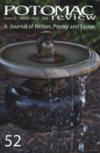Potomac Review – Winter 2013
The Potomac Review publishes fiction, nonfiction, and poetry from a wide selection of established and emerging authors. From the homepage of their website: “Our philosophy welcomes variety, and through it, we create an organic flow of ideas to contribute to the literary conversation.” The conversation in this issue is definitely worth checking out.
The Potomac Review publishes fiction, nonfiction, and poetry from a wide selection of established and emerging authors. From the homepage of their website: “Our philosophy welcomes variety, and through it, we create an organic flow of ideas to contribute to the literary conversation.” The conversation in this issue is definitely worth checking out.
I was impressed by the selection of strong fiction in this journal. “A Cliffside Home” by Tyler Evans, for example, is a funny ghost story with a tragic center: “There has been a ghost haunting our townhouse since my wife had her sixth miscarriage last month.” The ghost in this story has no solid form or clear identity, but it does imitate the everyday actions of our narrator: “It applies shaving cream to the area that I can only assume is its face. The lather glows luminescent in the air beside me for a moment before collapsing to the floor as a boiling froth.” The ghost attaches itself to the narrator and his wife, much to the narrator’s displeasure. The wife, on the other hand, wants to keep it like the child they always wanted but never had. Things change when the wife discovers she is pregnant. The ghost throws a tantrum like a petulant child. It smashes dishes and furniture because it is afraid of change. Over time, the ghost drops its immature behavior and the narrator accepts it as a permanent member of the family. They watch TV together and laugh at absurd commercials in a scene that is brilliantly written and full of warmth: “We laughed because it felt good. . . . We laughed just because the world was funny, and cruel, and brief but it was all we had, and soon the laughter began petering out as drowsiness overtook me.”
“Minutes Away From The Happiest Place on Earth” by Casandra Lopez takes the reader on a tour of the unspoken neighborhoods surrounding Disney’s Magic Kingdom theme park. The story is about a young girl who is sent to live with her aunt after her father died in prison. Too poor to afford entry, the girl and her sister can only experience the park from a distance as summer fireworks explode in the sky near their decrepit motel. She watches commercials for the Electrical Parade with her sister at the motel and yearns to share in the joy she sees on the TV: “A part of me wanted to believe in the possibility of the type of happiness that seemed to radiate from the pores on the children’s faces.” The aunt takes off for work and leaves the girl to take care of her younger sister, Patty. The girl greatly misses her father but at the same time wonders if he was not as perfect as she thought him to be. Regardless, she takes on the role of protector and caregiver for Patty, but danger emerges as the girl and her sister cross paths with a pimp and his prostitute. Patty chases after a ball, but doesn’t realize she is running in the pimp’s direction. The sister tries to stop her, but she is paralyzed with fear:
I realized I wasn’t going to be able to catch up to the ball or Patty, so I shouted her name, but it came out of my mouth as a screech. I felt my face redden from the heat and worry . . . I ran my fingers through my hair. It felt limp and soft, which made me feel young and small. When my hair was styled and hair sprayed in place I felt older and stronger. It was part of the mask I wore out into the world, and there I was without it when I wished everything about me was bigger, louder and stronger. The man held out his hand toward Patty. She tentatively stepped closer to him and held out her palm.
I like how Lopez builds the tension and shows the grinding poverty and misery surrounding the “Happiest Place on Earth.”
Another great story that involves children is Brandon Wicks’s “A Few Notes on Useless Suffering.” This story involves two brothers. The older brother is a scholar of religious studies and the younger is a mechanic. The latter is facing a mid-life crisis where his wife suddenly disappears and he is left to care for his two young boys. He moves in with his brother to help support the boys until the mother is found. However, the boys are a pair of mischievous devils and disrupt the orderly life of the scholarly older brother: “They were a constant blur of motion which made sustained attention difficult, if not impossible.” As the story progresses, we discover that both brothers are broken people. The older brother is lonely because he never knew love or had a family of his own, and the younger worries that he has failed as a father and a husband. The story is at times funny (the older brother’s constipation problem is a constant source of juvenile humor) but also very moving.
“Sunburnt Cosmonaut” by Bradley Somer offers an absurd little story set in the big city. The story shows a complicated relationship unfolding in an inner city apartment complex, but the point of view starts (sort of) with a man’s pet goldfish plummeting from the balcony of said apartment: “Our story doesn’t begin with a goldfish named Ian’s perilous plunge from his bowl on the twenty-third floor balcony where he, for as much as his brain could process, had been enjoying the view of the downtown skyline.” The story rewinds to earlier in the day when Ian the Goldfish is swimming safely in his bowl while his owner is cleaning the apartment and urging another woman out the door before his girlfriend arrives. Meanwhile, the manager of the apartment wonders why this nice girl is dating that cheating “pendejo” on the twenty-third floor and wonders how, if he were younger and more handsome, “he would’ve asked her for coffee, told her everything and comforted her if she cried.” As this human drama unfolds inside the apartment, Ian the Goldfish is accidentally knocked out of a window and falls “like an angel thrust down from heaven, like a sunburnt cosmonaut rocketing back to earth . . .”
There are other great stories and poems in this issue, but there’s not enough space to write about them all. Instead, I would suggest you buy a copy and read it for yourself.
[www.montgomerycollege.edu/potomacreview]





